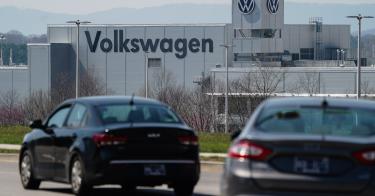Volkswagen workers in Chattanooga, Tennessee, will vote this week on whether to join the United Auto Workers, and President Biden is trying to help. Last month, Mr. Biden said, “I congratulate the Volkswagen autoworkers in Chattanooga who filed for a union election with the UAW.”
The vote comes right after Tax Day, and union dues would represent another bite from paychecks after federal and state taxes and Social Security and Medicare contributions. Only 6% of private sector American workers belong to a union; most don’t think the dues are a worthwhile investment of their hard-earned dollars.
VW workers rejected union representation in 2014 and 2019, and workers have similar reasons for doing so again. Employment at the Detroit Three automakers represented by the UAW has declined, and automotive jobs have moved to China with vehicle electrification.
UAW membership fell from 1.5 million in 1979 to 370,000 in 2023. Hence, the UAW needs new members to pay dues to fund union bosses’ salaries and pensions for retired union members in Detroit.
>>> Leaked Messages From UAW Official Reveal a Big Cause of Unions’ Decline
Dues for UAW hourly workers are 2.5 hours of pay per month. With average wages of $40 an hour, that’s $100 a month in dues, or $1,200 a year. This would help shore up the pensions of the UAW’s 580,000 retirees and pay the salaries of union officials.
UAW President Shawn Fain makes over $220,000 annually, over three times VW workers’ average wages. Mr. Fain flies to lavish events such as the March UAW National Stellantis Council Meeting in Puerto Rico with other union officials.
VW workers shouldn’t have to pay for union bosses’ perks or legacy pensions, and unionizing the plant contradicts workers’ interests.
Unionization would raise vehicle costs, undercutting VW’s competitiveness relative to auto companies whose workers are not represented by unions. For instance, Jim Farley, Ford’s chief executive officer, said earlier this year that Ford had a $7 billion to $8 billion cost disadvantage over other firms because of higher costs.
Higher costs from unionization are one reason the Detroit Three are announcing layoffs. Ford announced 1,400 layoffs in March, following layoffs in 2023. Stellantis had layoffs of 400 last month and ended jobs for 2,000 temporary workers. General Motors cut 1,300 workers last year.
One sign that the UAW does not stand up for members’ interests is the renegotiation of the UAW contract in 2023. It was an opportunity for the UAW to make Detroit carmakers reverse their commitment to go all-electric by 2035, preserving autoworkers’ jobs and continuing to make gasoline-powered cars popular with families. Yet the new UAW contract made GM, Ford and Stellantis uncompetitive with nonunion automakers and preserved the automakers’ plans to eliminate production of internal-combustion-engine cars by 2035.
>>> 64 Million Americans Risk Losing Work Under New Biden Administration Rule
Mr. Fain knows that electrification of the automobile will mean fewer autoworkers. He said: “Stellantis’ push to cut thousands of jobs while raking in billions in profits is disgusting. … Even now, politicians and taxpayers are bankrolling the electric vehicle transition, and this is the thanks the working class gets.”
The UAW did not successfully reverse companies’ destructive policies, even though Ford estimated that the industry would need 40% fewer workers to produce EVs. That’s 200,000 fewer jobs in 2030 and 400,000 fewer in the long run.
Mr. Biden can call for unionization at VW, but he can’t make VW do what’s in the best interests of VW employees. The UAW didn’t stand up for its workers at Ford, GM and Stellantis—and it won’t stand up for workers at VW if they vote yes this week.
This piece originally appeared in The Washington Times



